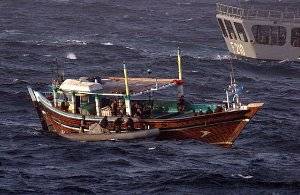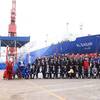Deterring Piracy at Sea
Contrary to the romanticized portrayal of pirates that have populated folk tales and captured youngsters' imaginations, modern-day pirates pose a clear and present threat to lives, commerce and the environment as they lurk over shipping lanes attacking ships and crew without regard for nationality or cargo.
Piracy in the Gulf of Aden not only poses a threat to global commerce, but also threatens aid delivery by the United Nations World Food Program (WFP) to victims of the ongoing civil war in Somalia. An estimated 2.4 million Somalis depend on the WFP shipments, which contribute more than 30,000 tons of aid to the impoverished nation.
In 2007, pirates attacked 31 vessels off the coast of Somalia with ransom demands averaging $500,000. In 2008, ransom demands have varied between $1m and $8m. Pirates received an estimated $30m in ransom payments in 2008.
More than 20,000 ships annually transit the Gulf of Aden, a vital shipping route for international trade that connects the Middle East, Asia, Europe and North and South America. However, with more than 100 piracy attempts this year, attacks affect less than 1 percent of the total commercial traffic.
Amid a decrease in the rate of successful pirate attacks on merchant vessels off the coast of Somalia, a couple of spectacular attacks have grabbed media attention. Pirates armed with AK-47s and rocket-propelled grenades (RPGs) boarded Motor Vessel (MV) Faina off the Somali coast Sept. 25, 2008, and took the ship and her crew hostage.
The situation of MV Faina represents the growing problem and complexity of the piracy issue in today's world. The ship is owned and operated by Kaalbye Shipping Ukraine, flagged in Belize, and her crew is from Russia, Latvia and the Ukraine. At the time, they were transporting 33 T-72 tanks, ammunition, small arms and associated equipment to Mombasa, Kenya.
As the pirates transited toward the harbor city of Hobyo, Somalia, several U.S. Navy ships quickly converged on Faina to ensure the safety of the crew and also prevent pirates from off-loading the ship's cargo.
Even more dramatic was the highjacking of the Liberian-flagged oil tanker MV Sirius Star Nov. 15, 2008. The Saudi-owned, supertanker was attacked about 450 nautical miles off the coast of Kenya and forced to proceed to anchorage near Harardhere, Somalia.
"Our presence in the region is helping deter and disrupt criminal attacks off the Somali coast, but the situation with the Sirius Star clearly indicates the pirates' ability to adapt their tactics and methods of attack," said Vice Adm. Bill Gortney, commander, Combined Maritime Forces.
According to the International Maritime Bureau (IMB), mariners have reported more than 100 pirate attacks, including 30 successful hijackings off the coast of Somalia and in the Gulf of Aden in the past. By the end of November 2008, pirates held 14 vessels and more than 330 crew members hostage.
In February 2002, U.S. Naval Forces Central Command (NAVCENT) established the Combined Maritime Forces (CMF), a coalition of more than 20 nations that operate throughout the Persian Gulf, the Arabian Sea, the Gulf of Aden and parts of the Indian Ocean. The coalition's mission is to deter destabilizing activities to create a lawful maritime order by defeating terrorism, deterring piracy, reducing illegal trafficking of people and drugs as well as promoting the maritime environment as a safe place for mariners with legitimate business.
To accomplish this mission, CMF established three principle task forces divided by geographic location: Combined Task Force (CTF) 158, CTF 152 and CTF 150.
While CTF 158 and 152 operate inside the Arabian Gulf, CTF 150 is a multinational task force that operates in the Gulf of Aden, Gulf of Oman, Arabian Sea, Indian Ocean and the Red Sea.
Established near the beginning of Operation Enduring Freedom, CTF 150 was created to counter terrorism, prevent smuggling and conduct MSO to help develop security in the maritime environment.
"CTF 150's mission is to provide a lawful maritime order and deny the use of the sea to terrorists and violent extremists," said Gortney. "We do this through our presence within the region."
Coalition ships monitor the presence of small skiffs around fishing and merchant vessels as well as provide assistance to regional mariners when requested.
"Fisherman tell us when we are out patrolling the waters near them, the pirates are usually at bay," said Fire Controlman 2nd Class Marko Fusilero, a VBSS team member aboard USS Ramage (DDG 61). "It's nice to hear we're making a difference."
USS Peleliu (LHA 5) and the 15th Marine Expeditionary Unit received a distress call, Aug. 8, 2008, from the Singaporean cargo ship Gem of Kilakarai in the Gulf of Aden, which reported being under attack from pirates aboard two skiffs. The pirates carried out their assault with small arms and rifle-launched grenades.
Only 10-miles away from the attack, Peleliu launched three helicopters, which successfully drove away the pirates.
A few weeks earlier USS Momsen (DDG 92) and its embarked helicopter detachment provided assistance to the crew of a German cargo ship that had been released by pirates. Momsen provided food and water after MV Lehmann Timber experienced engine trouble.
These incidents not only demonstrated the U.S. commitment to create a lawful maritime order in CTF 150, but also the capability of U.S. forces to respond on a moment's notice to any situation.
To help deter piracy and other destabilizing activities off the Coast of Somalia, ships assigned to U.S. 5th Fleet patrol the Gulf of Aden and Indian Ocean and conduct maritime security operations (MSO).
Naval forces conduct MSO to help develop conditions for security and stability in the maritime environment, as well as complement the counter-terrorism and security efforts of regional nations. These operations seek to disrupt violent extremists' use of the maritime environment as a venue for attack or to transport personnel, weapons or other material.
"Conducting maritime security operations in the Arabian Gulf contributes to security and stability in the region," said Capt. Brian Smith, commander, Iwo Jima Expeditionary Strike Group, currently deployed to the U.S. 5th Fleet area of operations. "We work closely with our coalition partners to achieve the same objective - ensuring the free flow of commerce across the seas. Together we are able to respond to any threat that might interfere with achieving that objective."
Coalition forces also conduct interaction patrols (IPATS), an element of MSO that helps generate support and awareness among commercial vessels sailing in the region of U.S. efforts to ensure a safe and secure maritime environment.
"When we go out to conduct approach and assist visits, our main goal is to establish better relationships with the mariners and locals who sail in the area," said Information Systems Technician 2nd Class (SW) Luke Ortega, a Ramage visit, board, search and seizure (VBSS) team member. "We let them know we're here to help."
VBSS teams conduct IPATS, which focus on putting a friendly face on the U.S. mission in the region. These visits to local mariners help to deter illegal activities on the high seas, as well as reassure them that coalition forces are operating in the region to ensure the sea lanes remain open and are safe to navigate.
Since arriving in the region in September, Ramage has been conducting IPATS alongside some 36 coalition ships at sea. These visits to merchant vessels, or dhows, help local mariners understand what coalition ships are doing in the region to ensure security and stability on the seas.
"Our boarding teams allow naval forces to engage in personable and positive communications with mariners and fishermen aboard vessels in the area," Lt.j.g. Trevor Knight, a boarding officer assigned to Ramage. "There is no replacement for face-to-face engagement, and our interactions with the local fishermen and mariners have been nothing but positive."
The personal touch of the VBSS interaction patrols has allowed the coalition to gain critical information on a broad range of threats to creating a lawful maritime order.
"We've been able to determine a normal operating rhythm in the area, and determination of the regional pattern of life helps coalition forces identify suspicious activity," said Knight. "Simple things such as emergency contact information, fresh water and assistance with engine repairs can lead to information on human trafficking, piracy and drug smuggling."
Ensign Dan Ciulla serves as one of the VBSS officers aboard USS Nitze (DDG 94) and leads the ship's team conducting the IPATs.
"Our mission out here is three-fold: We want to make our presence known, render assistance if needed and create a friendly environment with the local mariners," said Ciulla. "By sending a small team in the RHIB (rigid hull inflatable boat), we are able to appear less intimidating."
"If we go out and make just one dhow's crew feel comfortable and build their trust in the coalition and its mission, then our job has been a success," he said. "In the long run, we will build a network of support that will prove to be beneficial."
One of Nitze's boarding team members, Operations Specialist 2nd Class Anthony Machulcz, expressed similar sentiments.
"I think it's good that the local mariners see we are out here to help," he said. "We give them food, water and ways to contact us if they need to. After we complete our visit, they seem very happy we've come aboard."
USS Russell (DDG 59) Sailors also responded to a call to render assistance and save lives when they aided a small boat in distress between Bossasso, Somalia, and the Yemeni coast. The 45-foot small boat experienced serious engine problems, leaving it unable to operate at sea, and had been adrift for two days. There were approximately 70 personnel on board the vessel, some of whom were in need of immediate medical attention. Seven personnel were transferred to Russell and treated for severe dehydration and malnutrition.
"The seas are the 'global commons,'" said Smith. "Our goal here is to strengthen and build relationships, and help mariners feel safer. That's the essence of maritime security operations - coalition nations working together to keep the maritime environment safe."
In response to a significantly increasing number of attacks in the region on merchant vessels, U.S. Naval Forces Central Command (NAVCENT) took a more robust approach to deterring piracy and other destabilizing activities in the Gulf of Aden.
Gortney, in his capacity as Commander, CMF, directed the establishment of a maritime security patrol area (MSPA) in the Gulf of Aden, Aug. 22, 2008, a moveable area overlaid within the internationally designated traffic corridor.
The MSPA is in support of the International Maritime Organization's (IMO) call for international assistance to discourage attacks on commercial vessels and is designed to give the IMO time to develop an international accord that will ultimately lead to a long-term solution. Merchant mariners have been actively encouraged to travel through this traffic corridor and employ reasonable self-protection measures to deter piracy attempts.
CTF 150 warships from the United States; United Kingdom; France; Denmark; Pakistan; Canada; and maritime patrol aircraft from the United States; United Kingdom; France; Germany; and Spain, patrol this geographic area in the Gulf of Aden on a routine basis. They have been joined by ships from Malaysia, India, Russia, South Korea, NATO and the European Union.
NAVCENT is working with a number of international organizations such as the IMO and IMB to encourage mariners to transit through the MSPA.
Since the MSPA was formed, CTF 150 has helped thwart more than 30 piracy attacks in the Gulf of Aden. But criminals have still successfully targeted several vessels in the region.
"The MSPA is an advisory route," said Royal Navy Commodore Tim Lowe, deputy commander, CMF. "We cannot guarantee security as it is a huge area – 205,000 square miles in the Gulf of Aden alone."
NAVCENT is encouraging mariners to take necessary precautions to improve the safety of their ship and crew.
"Mariners must remain vigilant," said CTF-150 commander, Danish Royal Navy Commodore Per Bigum Christensen. "A ship's master and her crew are the first line of defense for their own ship."
Gortney suggested that the shipping industry consider hiring security teams for their vessels especially given the vast size of the area to be patrolled.
"The coalition does not have the resources to provide 24-hour protection for the vast number of merchant vessels in the region," said Gortney. "The shipping companies must take measures to defend their vessels and their crews."
This fact has been highlighted by merchant mariners who have taken proactive measures to defend their vessels, and have thwarted attacks as a result.
Such measures have included deterring attacks simply by keeping a sharp lookout for suspicious small boats operating in the vicinity of their ships, increasing speed and maneuvering to avoid small craft and even repelling would-be boarders with water from fire hoses.
"As long as private security firms stick to the rule of law, it could be a good thing," said Lowe. "Having an armed sentry on the deck is quite a good deterrent factor."
According to an Associated Press report, some insurance companies have offered to cut premiums by 40 percent if shipping companies hire security. Insurance premiums for vessels transiting the Gulf of Aden have been raised tenfold since the recent surge in piracy.
The U.S. government, together with the international community at large, is also working to provide a mechanism for bringing the pirates to justice and for holding them accountable for their actions.
"We need to maintain this momentum, and can't get fooled into thinking that by deterring attacks the problem has gone away," said Lowe. "The answer to this problem lies ashore. The way to do this is for the international community to work with Somalia to help them overcome their problems and establish the rule of law."
Although piracy may continue to be a problem into the foreseeable future, U.S. and coalition forces are committed to working with the international community to help develop a more permanent solution to this problem.
"The U.S. is very concerned about the increasing acts of piracy at sea off the coast of Somalia," said Gortney. "The U.S. Navy will continue to work in the region to help ensure a lawful maritime order and make sure the sea lines of communication remain open."
Operations in the NAVCENT and CMF area of operations are focused on reassuring regional partners of the United States and coalition commitment to security, which promotes stability and global prosperity.
(Source: Navy News Service)















